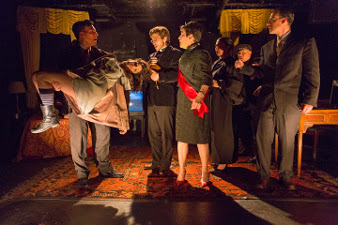|
|
 |
| L-R: Rafael De Mussa, Ines Lucas, Jacopo Rampini, Maria Wolf, Zoe Watkins, Jon Okabayashi, Carlo Giuliano. Photo by Richard Termine |
NEW YORK, May 21 -- This past weekend Horizon Theatre Rep opened Jean Genet’s “The Balcony” at the Access Theatre. Horizon’s production is given a contemporary spin as the parallels between Genet’s original work, drawing early inspiration from Franco’s conquest of Spain, is paralleled with the current turbulence of the political state of Europe. Director and actor Rafael De Mussa defends this artistic choice, believing: “In Franco’s Spain, the world was changing. Now, the world is changing again.”
Set here against a backdrop of a Europe in the turmoil of attempted re-unification, “The Balcony” follows those in power as they desperately cling to their status by playing our wild erotic fantasies. Originally set in a bordello in an unnamed country, De Mussa contemporized the setting into an upscale hotel. Rather than riots and chaos on the streets, televisions cover the European financial crises and the icons “at the top” resemble more closely the icons of more recent generation as a search for leadership is explored in the world at large. Those who feel threatened represent, according to De Mussa, are “the reflections of icons in society. The institutions are represented by these icons.” For example the Church is represented by the Pope and the Judge as a representation of the judicial system as a whole.
Each of the characters embrace a ritualistic way of re-asserting
their power through erotic interplay, but the build-up is never
consummated. It isn’t about that. The play is sexual but
the act never happens. The erotic nature is displayed in the foreplay
of the re-establishment of power. The erotic nature is also evidence
of the image obsessed culture of high power societies. “The
sex is also a mask,” says De Mussa. “Sex is a powerful
tool.”
The re-establishment of image was important to De Mussa’s
perspective on Genet’s work. In exploring the desperate
attempt for the pillars of society to cling to their power, De
Mussa believes that we begin to see the weakness in the humans
behind the iconography.
“It’s the power of the image,” De Mussa explains. “It’s not so much what you know rather what you just project. It’s the soundbite rather than the depth of text and how powerful the image can be. If you spin it well and control your image you gain more power.”
De Mussa feels that the play is timeless in that a lack of strong leadership has been a recurring incidence throughout human history. “The Balcony” works as a cautionary tale to the vulnerabilities of divided nations. Dictatorships are formed by strong-images in relation to weak nation. De Mussa is reminded that the strong images of Hitler, Mussolini and Franco all gained control of nations that were leaderless.
He hopes the you will “Recognize yourself in the satire and the obsession with image,” and adds:
“I think the play works as a satire or a metaphor of a continent in transition. Europe is going through tremendous changes as national borders are eliminated and immigration brings in new ways of thinking. This challenges old institutions, like religion, the law and our idea of self defense and the military. So like the Phoenix , the Continent must burn itself down in order to be reborn. As it looks for new leadership the play works as a cautionary tale that whenever there is change there is also the possibility for greater evil as Europe witnessed with the rise of the great dictators.”
IF YOU GO
May 16 to June 2, 2013
The Access Theatre, 380 Broadway @ White Street (2 blocks South
of Canal), 4 fl. (TriBeCa)
Subways: A, C, E, J, Z, N, Q, R, 6 to Canal St.
Presented by Horizon Theatre Rep (www.HTRonline.org)
Wednesday’s through Saturdays at 8:00 PM, Sundays at 3:0
PM
Tickets $18 (tdf); Box office: SMARTTIX (212) 868-4444 or www.smarttix.com
| lobby | search
| home |
cue-to-cue | discounts |
welcome | film
| dance | reviews
|
| museums |
NYTW mail | recordings |
coupons | publications |
classified |

